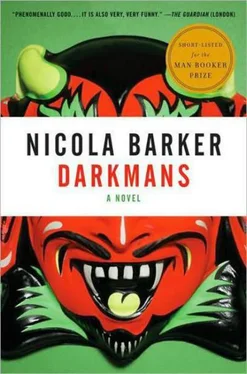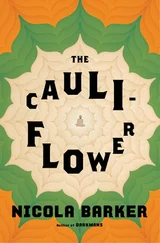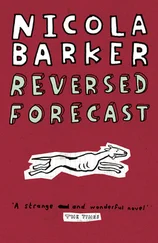‘Pardon?’
‘Lid?’ Gaffar indicated towards the Tupperware beaker on Beede’s reading table.
‘ Lid? ’ Kane stared at the beaker, frowning.
‘Ah, fuck it… English ,’ Gaffar murmured, turning back — resignedly — to his meal.
Kane placed the brown envelope onto Beede’s reading table (next to the contentious item of Tupperware), carefully balanced his cigarette there — its smouldering tip suspended over the carpet — and then kneeled down to inspect his pile of books. If there was one thing he could be certain of: Beede’s books would speak (a-hem) volumes …
On top of the pile (and it was a large pile) was what Kane — smilingly — took to be a real ‘Beede classic’: Derek Johnson’s Essex Curiosities ; Hardback. 1973. He picked it up and opened to the front flap–
Ah yes
‘A representative collection of the old, curious and interesting objects that abound in Essex…for all those who cherish the heritage of the past and wish to preserve it for the future.’
Lovely
Kane put the book aside, with a grin.
Next up–
Ha!
Victor Papanek’s Design for the Real World .
Brilliant!
Inside flap:
Ta-dah!
‘A startling and constructive blueprint for human survival by a professional designer who accuses the Industrial design “establishment” of mass negligence.’
(Oh God. The word ‘establishment’ stuck into those two, accusing little inverted commas…How right! How po-faced! How deliciously sanctimonious! How typically fucking Beede .) Kane sniggered, furtively, then laid the volume down, almost fondly, turning — for a brief moment — to take a quick puff on his cigarette–
Okay, okay…
He deftly returned his cigarette to its former position–
Soooo…
Third in the pile, a very new-looking paperback called–
What?!
The Yoga of Breath: A Step-by-step Guide to Pranayama by Richard Rosen.
No
Kane picked up the book and stared at it, scowling (as if the mere force of his disapproval — and incomprehension — might make it disappear. But it didn’t. It remained a steady weight in his hand; a neat 3 lb tome of ridiculously incongruous NewAge hokum).
He slowly shook his head as he flipped it over and speed-read the sales pitch–
Blah blah…life energy…
Blah blah…self-transformation
Blah blah…breath and body awareness
Nuh-uh!
Beede ? Reading a book about yoga ? It made absolutely no sense (this strangely fashioned block simply wouldn’t fit inside the box of traditional shapes Kane had painstakingly carved out for his father). He cast the book aside, hissing under his breath. It was a red herring. A blip . Some ditsy woman at work had loaned it to him — or that damn chiropodist with her stupid verrucas–
Hysterical?
Yeah
Ha bloody ha
The next book in the pile was larger and more traditional. Kane grabbed it–
Oh yes…
That was better: a thick, smart paperback (with illustrations) called A History of Private Life: Revelations of the Medieval World . He opened it, randomly, to a black and white reproduction of a small painting of a hairy youth (naked) from the fifteenth century, under which was written: ‘The bear showed great affection for the child and suckled it for an entire year. Because of this feeding the child became as hairy as a wild beast and ate raw meat: Valentin et Orson .’
For some arcane reason Kane felt strangely comforted by this caption (something — however weird — translated from Latin. That was him , that was Beede: obscure, marginal, bookish, inaccessible…).
He sneered (feeling the comforting re-emergence of all his former prejudices), and turned back a few pages, his eye randomly settling on a small sub-heading entitled, ‘The Frantic Search for the Father’. He started, slapped the book shut, and threw it down.
Paranoia
He closed his eyes (pushing back a sudden panic–
Push
Push )
— swallowed hard and tried to focus his mind again–
Tramadol
Yes
He imagined a small blister-pack in his pocket, rested an illusory hand upon it, heard the neat click and the tiny rattle–
Ahhh
It worked just like magic.
Righty-ho…
Next up: three neat paperbacks, all by the same author: a Dutchman called Johan Huizinga. These had been exceptionally well-thumbed (even by Beede’s standards — and he was nothing if not thorough). The first was entitled The Waning of the Middle Ages (a historical classic, it claimed on the back). Numerous pages had been turned over at their corners (approaching a third of the total), and there was still one of Beede’s red pencils jammed rudely inside it (Beede liked to underline relevant words and sentences as he read — a strange quality in someone usually so circumspect — showing very little respect, Kane always felt, for the integrity — and binding — of a book).
He opened the text to its pencil marker and read (underlined with great zeal): ‘So violent and motley was life that it bore the mixed smell of blood and roses.’ ‘Smell’ had been circled and then asterisked. Underneath that: ‘After the close of the Middle Ages the mortal sins of pride, anger and covetousness have never again shown the unabashed insolence with which they manifested themselves in the life of preceding centuries.’
Next to this, in the margin, in block capitals, Beede had written: ‘UNTIL NOW!’
Kane shut the book with a snort. His search became more impatient.
Another Huizinga book: Men and Ideas: History, the Middle Ages, the Renaissance , was tossed on to the floor, followed by — uh —Homo Ludens: A Study of the Play-Element in Culture—
Eh?!
— with its lovely cover (red and black, the kind of graphics favoured by the best casinos in 1950s Vegas). Sample quote: ‘The human mind can only disengage itself from the magic circle of play by turning towards the ultimate.’
Wha?!
He sniffed. This was getting him nowhere, but that was okay, because it was pretty much where he wanted to be…
Right
A.R. Myers, England in the Late Middle Ages; Mary Clive, This Sun of York: A Biography of Edward lV ; Joseph and Frances Gies, Life in a Medieval Castle—
Hmmn…
Was there some kind of theme emerging here? Kane frowned. It was a little strange, perhaps — this intense level of focus on such a particular time-frame — but–
Aw heck!
— the history he could take. It was bone-dry, like Beede. The history made sense to him. It was old and silly and wonderfully unthreatening. It didn’t shock or unsettle or confound. It was dead. It was done. It was after .
Phew
Next up–
Ay ay—
Shakespeare: The Complete Plays (markers in all of the Henries and Richard III ), followed — hard-upon — by another ridiculously hefty volume: John Ayto’s Dictionary of Word Origins . Kane lugged it aside, with a small grunt, boredly. Under that, Robert Burchfield’s far more svelte and shapely The English Language . He flipped it over and ran his eye across a brief spiel on the back about how the mother tongue was so ‘resilient’ and so ‘flexible’…
‘The English Language is like a fleet of juggernaut trucks,’ he read, somewhat perplexedly, ‘that goes on regardless.’
Читать дальше
Конец ознакомительного отрывка
Купить книгу












